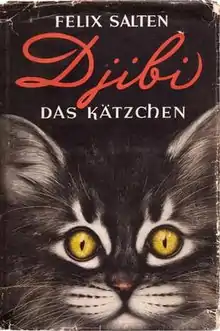 First Swiss edition. | |
| Author | Felix Salten |
|---|---|
| Original title | Djibi das Kätzchen |
| Translator | Raya Levin |
| Illustrator | Walter Linsenmaier |
| Country | Switzerland |
| Language | German |
| Genre | novel |
| Publisher | Albert Müller |
Publication date | 1945 |
Published in English | 1946 |
| Pages | 113 |
Djibi, the Kitten (German: Djibi das Kätzchen) is the last novel of Felix Salten, published originally in 1945 and translated into English in 1946. Similarly as in other Salten's late books, the protagonist is an animal, this time a young female cat called Djibi.
In Renni the Rescuer, the main animal character had been a loyal servant to humans, but Djibi is an independent cat who chooses for herself where to live.[1] The novel begins dramatically with a drowning attempt which the young kitten survives. A boy rescues her from the river and takes to his home where a dog adopts her and feeds along with other puppies. But when the boy rebuffs the cat, she leaves the farm immediately and, for a while, lives in the forest and kills pheasants. After being wounded by a gamekeeper, she decides to take shelter with humans again, and a kind teacher, Salten's alter ego, adopts her. After that, Djibi lives with the teacher and his wife, but her strong hunting instinct finally leads Djibi to her demise.
The main theme of the book are the reciprocal interactions between men and animals, especially cats and dogs.[2] Unlike in Salten's earlier animal novels, for instance Bambi's Children, there isn't much anthropomorphism in Djibi — there is only one short dialogue between Djibi and a marten.[3] The human characters, in contrast to the animals in the book, mostly have no personal names, but are referred to as “the teacher,” “the farmer,” etc.
The first English translation of Djibi by Raya Levin appeared in the United Kingdom in 1946, illustrated by Walter Linsenmaier as the original Swiss edition, but there is also an anonymous American translation, Jibby the Cat, illustrated by Fritz Kredel, which was published in 1948 by Julian Messner in New York City. This edition differs greatly from Salten's original text. Not only has it a happy ending — Djibi's death is left out — but it also has a happy opening added to it: the novel begins with five pages depicting Djibi's (or Jibby's) sweet life before the attempt on her life.[4] The novel has been largely rewritten, and new incidents have been added to the story. For instance, in the Swiss and the British edition, the boy takes the kitten from the river directly to his home, but in the American edition, he first takes it to the teacher (or “schoolmaster Victor” in this edition). The Americal edition also adds chapter numbers and chapter titles to the book,[5] and most human characters have personal names.
For example, the episode where Djibi decides to leave the farm is very different in the two English-language editions. The British edition follows very closely Salten's original German-language text,[6] but the American edition has it rewritten:
| British edition | American edition |
|---|---|
|
The boy ran howling out of the stable. But because he was hungry, he ran into the kitchen. |
Peter's face went suddenly white, and he turned and ran through the barn to the hayloft. His throat burned, and he held his fists clenched at his sides and his body rigid. |
The book has also been translated at least into French in 1946[9] and into Swedish in 1974,[10] both with Linsenmaier's illustrations; the Swedish translation is slightly shortened.[11] A 2016 Finnish translation is unillustrated.[12] In 2016, Raya Levin's translation was published also in the United States, illustrated presumably by Richard Cowdrey.[13]
References
- ↑ Eddy, Beverley Driver (2010). Felix Salten: Man of Many Faces. Riverside (Ca.): Ariadne Press. p. 303. ISBN 978-1-57241-169-2.
- ↑ Ehness, Jürgen (2002). Felix Saltens erzählerisches Werk: Beschreibung und Deutung (in German). Frankfurt am Main: Peter Lang. pp. 258–259. ISBN 3-631-38178-6.
- ↑ Djibi, the Kitten (1946), pp. 20–22.
- ↑ Salten, Felix (1948). Jibby the Cat. Illustrated by Fritz Kredel. New York: Julian Messner, Inc. pp. 1–6.
- ↑ Contents at Deutsche Nationalbibliothek.
- ↑ Djibi das Kätzchen (1945), pp. 14–15. (Extract on-line.)
- ↑ Djibi, the Kitten (1946), pp. 9–10.
- ↑ Salten, Felix (1948). Jibby the Cat. New York: Julian Messner, Inc. pp. 38–40.
- ↑ Salten, Felix (1946). Djibi, le petit chat. Traduction de Jacqueline Des Gouttes. Vingt dessins à la plume de Walter Linsenmaier. Neuchâtel: Delachaux & Niestlé.
- ↑ Salten, Felix (1974). Djibi den lilla katten. Från tyskan av Edward Brehmer. Illustrerad av Walter Linsenmaier. Malmö: Berghs Förlag. ISBN 91-502-0016-X.
- ↑ Two metaphysical dialogues, beginning from pages 111 and 120 in the 1945 German-language edition, are left out from the Swedish edition, where they should begin on pages 115 and 122, respectively.
- ↑ Salten, Felix (2016). Kissanpentu Djibi. Suomennos Markus Lång. Helsinki: Books on Demand. ISBN 978-952-339-378-3.
- ↑ Salten, Felix (2016). Djibi. Translated by Raya Levin. New York: Aladdin. ISBN 978-1-4424-8765-9.